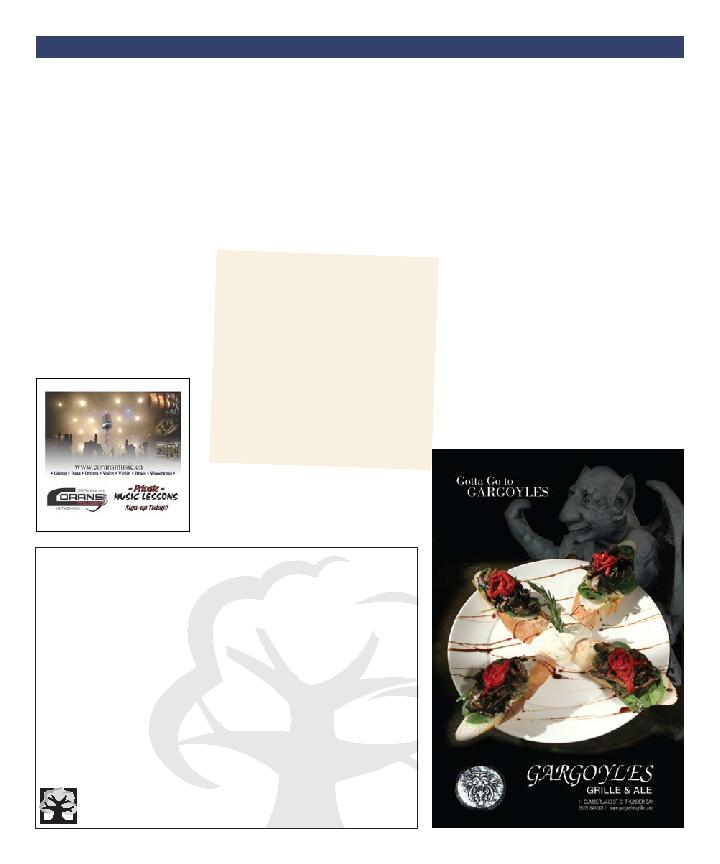
28
The Walleye
Food
28
The Walleye
the
Wall
The Wall
The stay-at-home vacation
Marlene Wandel
The word staycation is irksome, though the con-
cept is useful, timely, even charming. Not every
idea needs a gimmicky new word, unless of course
you need to market said concept. It makes sense, if
you're marketing a city as a getaway destination, for
it to also be a great place to stay and enjoy. This is
particularly true if your city happens to lounge on the
shore of a lake astonishing for its breadth, depth and
beauty. With trees and rocks and nature
in all its grandeur within city limits, and
stretching to hundreds of kilometers in
every direction without any real urban in-
terruptions, why would you go anywhere?
Isn't the legendary Canadian vacation all
about the sparkling water and the canoe?
The staycation here is almost a no-
brainer. The town empties out every week-
end in the summer, but everyone is back
on Sunday night. This is the land of going to camp.
A visitor might confuse camp with a cabin, or a cot-
tage, or even with camping. It's with a certain glee
that people point out that here, there are no cottages
or cabins. There is just camp.
Camp encompasses bare land with dreams of
dwellings etched nowhere but the owner's minds, and
houses with far more amenities than your average
house in town, and every kind of shack or camper
in between. While "cabin" or "cottage" conjures
up images of the actual physical structure, "camp"
is more of a concept. Camp is away, but still here.
Camp is often the repository for loved items that
are not good enough for the
house anymore, but too good to get rid of. Camp
is the place you can go for a night or three weeks,
and commute to work if necessary. Camp is almost
always on the water, a license to eat chips and have
popsicles before noon (and other sundry refreshments
reserved for later hours in the urban setting). Camp
is not a hellish Friday afternoon traffic gauntlet, and
ideally, out of range of cellular and work-related
types of intrusion. The only type of wardrobe camp
requires is your own cast-offs from town.
Having said all that, camp is not a prerequisite for
sticking around here in the summer. There's always
the good old-fashioned camping version of away-but-
here, at the host of provincial and national parks we
have within a three hour radius. It's pretty easy to
stick around here in the summer, and still get away
somewhere really beautiful, and eat chips before noon
with your feet in the sand, or enjoy the sparkling
water from some sort of watercraft. Now, if someone
could just come up with a better word that captures
the essence of both stay and vacation, life would be
perfect.
Food Security Research Network
www.foodsecurityresearch.ca (807) 343-8447
learn. eat. think. grow.
Got an interest in food production?
Help us help you make our community a better place to
Community Service Learning Courses through the Food Security Research
Network bring academic knowledge and the growing skills of committed
students into the community.
Your participation helps our students bring community knowledge back to
the classroom.
Want to work with one of our member professors to grow your business or
organization? Contact FSRN today.
Etymology of Staycation
The orgin of staycation can be traced to an episode
of Corner Gas in which comedian Brent Butt went
on a `staycation' across the street from his gas station.
The subsequent popularity of the concept is attrib
-
uted to the recent financial crisis during which time
many families choose to vacation closer to home in
an effort to save money. In 2009 the word `staycation'
was officially added to the leading US dictionar
y,
Merriam-Webster's Collegiate Dictionary. Ironically,
Lake Superior State University added it to its 2009
List of Banished Words stating that a vacation is not
synonymous with travel.:

